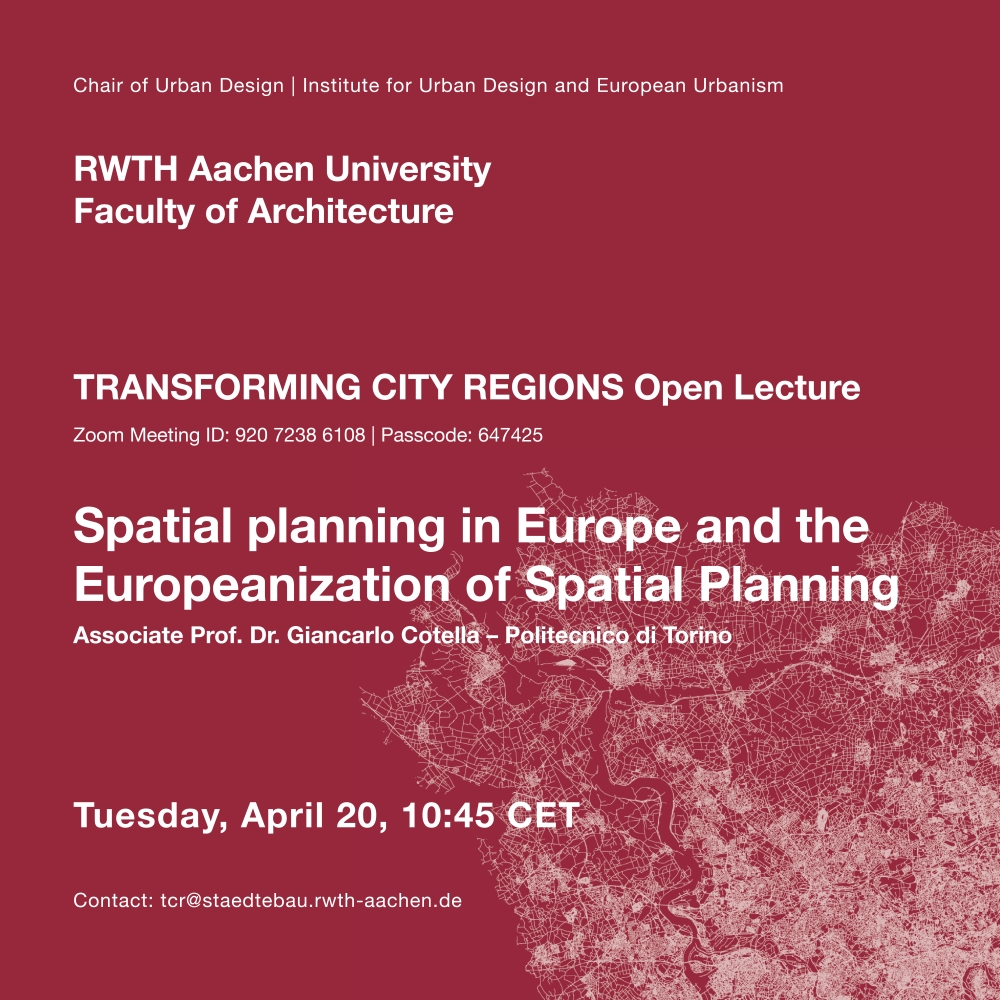Spatial planning in Europe and the Europeanization of Spatial Planning
TCR News April 20th
Associate Prof. Dr. Giancarlo Cotella – Politecnico di Torino
Date: Tuesday, 2021 April 20 10:45 CET
https://rwth.zoom.us/j/92072386108?pwd=dDVzc0NmL2dYcVVOV3hndS9rcCtMdz09
Meeting ID: 920 7238 6108, Passcode: 647425
Registration is not required.
Abstract:
Since the industrial revolution, raising urbanisation rates and the movement of population away from agriculture towards the industrial and services sectors have increased development pressures dramatically. The impact of these phenomena have been such that all European countries have deemed it necessary to establish some effective procedure to channel these pressures and resolve conflicts between competing land uses. Legislation has been introduced in each country to establish the principle that public authorities should be empowered to monitor and control territorial development and prepare plans, identifying what types of development will be permitted and where they would be most appropriate. This happened at different times in different countries from the late nineteenth century onwards, depending on political attitudes to the acceptability of such powers, which may be regarded as infringing individual rights to exploit private property, and diverse perceptions of the value of planning in different contexts. Hence, the specific histories and geographies of particular places, and the way these interlock with national institutional structures, cultures and economic opportunities contributed to generate a high heterogeneous set of territorial governance and spatial planning systems in Europe. A discussion on the notion of ‘spatial planning system’ as well as on similarity and differences that characterise planning systems is a preliminary step for the understanding of spatial planning in Europe.
At the same time, since the late 1980s, the increasing need to consider the spatial impacts of the European Union sectoral spending programmes had fostered the development of a heterogeneous set of spatial concepts, tools and processes at the continental scale. This whole set of phenomena, included under the umbrella term ‘European spatial planning’, has increasingly attracted the attention of European planning practitioners and scholars, because of the innovative tools, approaches and methodologies introduced in a field in which the EU does not detail any formal competence. In this light, why the EU had necessity to intervene in planning policy issues and how, the lack of formal competences notwithstanding, this is currently possible and even welcome by all European countries are not idle questions. In this light, a backward account of distinct ‘dimensions’ of European spatial planning – structure, discourse, tools and practices – is proposed and specific ‘channels’ conveying domestic change and the EU progress in joint territorial governance activities are identified, highlighting the role of EU territorial governance as a meaningful catalyst of Europeanization.
Giancarlo Cotella (M.Arch., Ph.D.) is associate professor at the Interuniversity Department of Regional and Urban Studies and Planning (DIST) of Politecnico di Torino. His research mainly focuses on European Territorial Governance, in particular on the mutual influence occurring between European Spatial Planning and the spatial planning systems characterising the different Member States. Giancarlo has took active part to several international research projects, among which it is worth to mention ESPON 2.3.1 ESDP, ESPON 2.3.2 Governance, LisGo, ESPON FOCI, ESPON Smart-IST, ESPON TANGO, FP7 Mlesecure-2050, ESPON ReSSI, ESPON URRUC, ESPON COMPASS and ESPON SUPER. He published several contributions on various international scientific journals and edited books, and he is actively involved in AESOP (The Association of European Schools of Planning).
